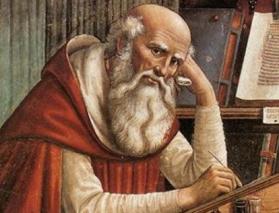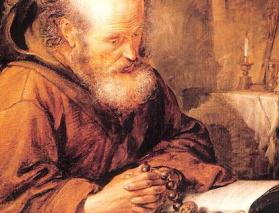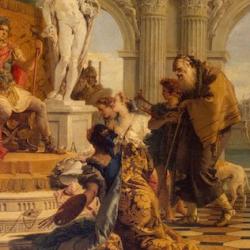Cicero wanted to defend the reality of human freedom against the Stoics. But the issue of divine foreknowledge stood in the way. How could human choices be truly free if God knew those choices ahead of time?
As Augustine summarized Cicero’s concern (City of God, 5.9), “if all future things have been foreknown, they will happen in the order in which they have been foreknown; and if they come to pass in this order, there is a certain order of things foreknown by God; and if a certain order of things, then a certain order of causes, for nothing can happen which is not preceded by some efficient cause. But if there is a certain order of causes according to which everything happens which does happen, then by fate, says he, all things happen which do happen. But if this be so, then is there nothing in our own power, and there is no such thing as freedom of will.”
Or, one could reason backward along the chain of causes: “If there is free will, all things do not happen according to fate; if all things do not happen according to fate, there is not a certain order of causes; and if there is not a certain order of causes, neither is there a certain order of things foreknown by God, for things cannot come to pass except they are preceded by efficient causes, but, if there is no fixed and certain order of causes foreknown by God, all things cannot be said to happen according as He foreknew that they would happen. And further, if it is not true that all things happen just as they have been foreknown by Him, there is not, says he, in God any foreknowledge of future events.”
If we have no free will, Cicero argues, then the whole of human life unravels. There is no point in laws and punishments; “reproaches, praises, chidings, exhortations” become mere charades.” In short, “the whole economy of human life is subverted” (omnis humana vita subvertitur; Cicero’s words, from de divinatione 2.49).
If social life is going to be meaningful at all, then we have to have free will. And so, forced to choose between foreknowledge and freedom of God, Cicero chooses free will. Augustine puts it pointedly: “wishing to make men free, he makes them sacrilegious.”
Augustine himself refuses to choose: “the religious minds chooses both, confesses both, and maintains both by the faith of piety.” But Augustine knows that faith can’t obfuscate the problem: How can both be true? How can we be free if God infallibly knows our choices ahead of time?
Augustine’s answer is complex. I’ll deal with what I consider his most decisive conclusions below, but along the way he makes a couple of intriguing moves, both of which amount to shifting the context of the discussion from impersonal fate to the Triune personalism.
He doesn’t like the term fate because the determination that men call fate is actually “the will of God.” He’s willing to accept the term “fate” itself, so long as it is understood in an etymological sense, derived from fari, “to speak.” Citing Psalm 62:11-12, he says that God speaks immovably, “unchangeably hath He spoken, inasmuch as He knows unchangeably all things which shall be, and all things which He will do.” Fate is not in the stars but in the speech of God.
In the speech and in the Spirit. He acknowledges that philosophers have divided causes into various kinds: “non omnem causam esse fatalem, quia est causa fortuita, est naturalis, est voluntaria. From a Christian perspective, though, all types of causes are ultimately one. Voluntary causes might express the will of God, of angels, of men, or even (if we can call instinct voluntary) of animals. No efficient cause comes to be unless there is a voluntary cause at work, the will of “the spirit of life . . . which quickens all things, and is the creator of every body, and of every created spirit.” The will of this spirit of life is the will of God Himself, since the Spirit is God Himself: “In His supreme will resides the power which acts on the wills of all created spirits, helping the good, judging the evil, controlling all, granting power to some, not granting it to others.” He bestows all powers, but He is not the giver of all wills, since “wicked wills are not from Him, being contrary to nature.”
In this scheme there is no room for fate as understood by the philosophers. God’s speech and God’s Spirit, which is to say the will of the Triune God, is at back of all causes.
Augustine’s more decisive answer to the conundrum is to explain that freedom is included within the order of God’s speech and the working of God’s Spirit: “it does not follow that, though there is for God a certain order of all causes, there must therefore be nothing depending on the free exercise of our own wills, for our wills themselves are included in that order of causes which is certain to God, and is embraced by His foreknowledge, for human wills are also causes of human actions; and He who foreknew all the causes of things would certainly among those causes not have been ignorant of our wills.” Augustine here asserts God’s true transcendence. He is not simply at the end of a chain of wills. His foreknowledge embraces the whole, and since He is not competing on the same created terrain with created wills, there is no conflict between human freedom and divine foreknowledge. Within that foreknowledge is foreknowledge of free choices. We might even put it this way: Choices are free because God foreknows them as free, because what He foreknows is reality itself.
This does mean, Augustine admits, that created freedom is limited, bounded by the will and foreknowledge of God: “Wherefore our wills also have just so much power as God willed and foreknew that they should have; and therefore whatever power they have, they have it within most certain limits; and whatever they are to do, they are most assuredly to do, for He whose foreknowledge is infallible foreknew that they would have the power to do it, and would do it.”














